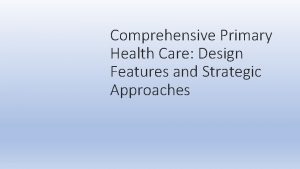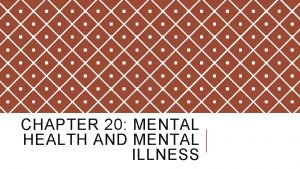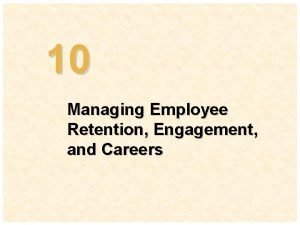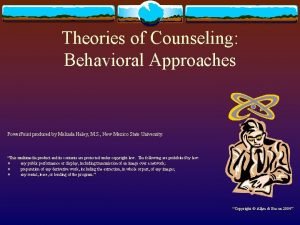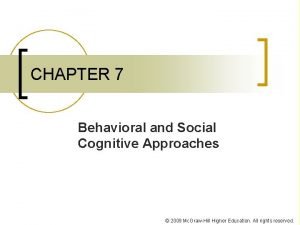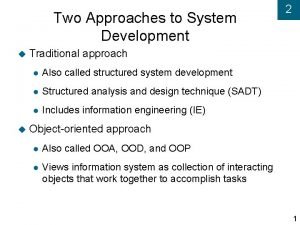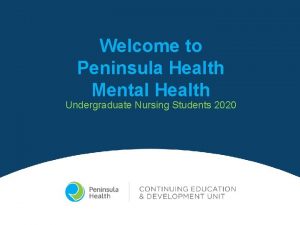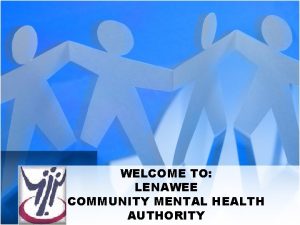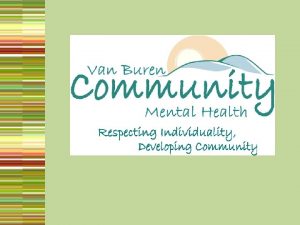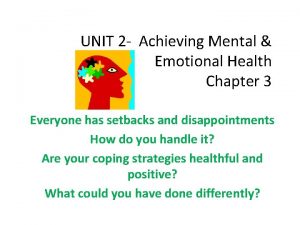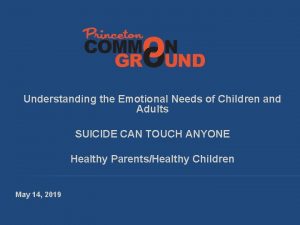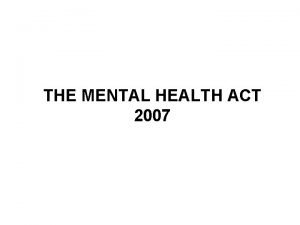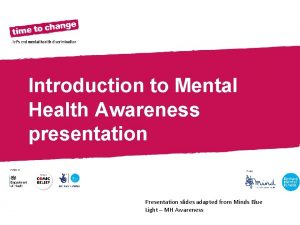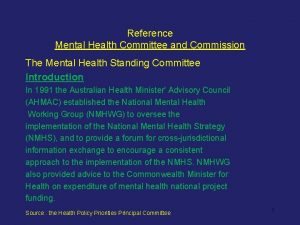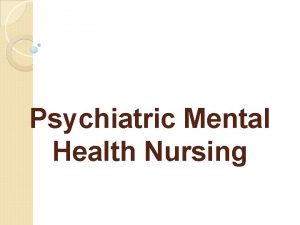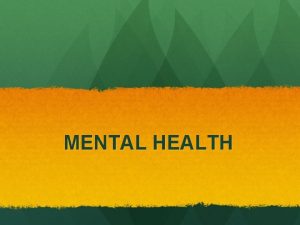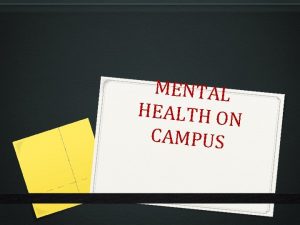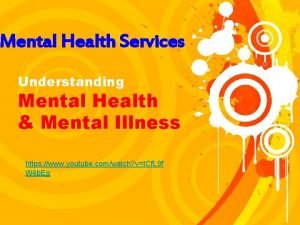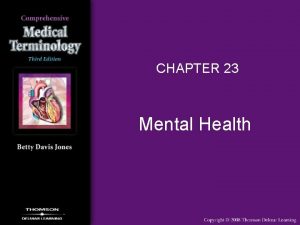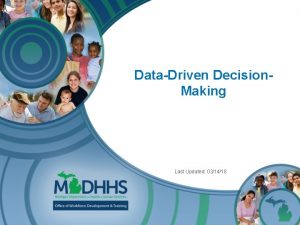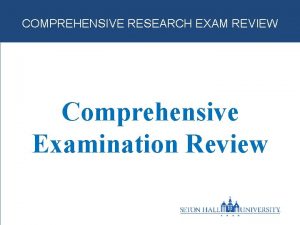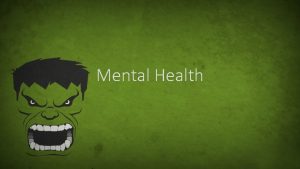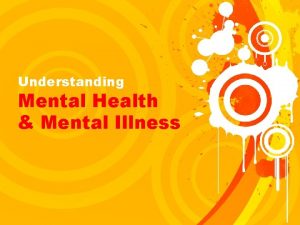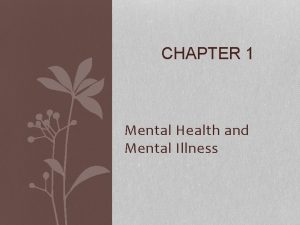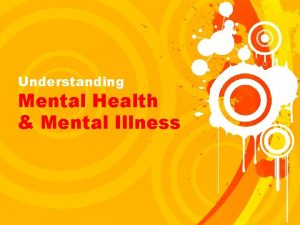Mental Health on Campus A Comprehensive DataDriven Approach
























- Slides: 24

Mental Health on Campus: A Comprehensive, Data-Driven Approach Nance Roy, Ed. D Chief Clinical Officer The Jed Foundation

Who We Are • Origin – JED’s story • History – Evolution over the past 20 years 2

The issue

Mental health problems are common in young people 30% of college students report being diagnosed with or treated a mental health condition in prior year Anxiety (22%) and depression (18%) are the most common problems Sources: NAMI, SAMHSA, JED Harris Poll, 2017 County Health Rankings 4

Symptoms Are Common At some point in past year: • 69% felt very sad • 63% felt lonely • 63% felt overwhelming anxiety • 8% self injured • 12% had serious thoughts of suicide • 1. 7% reported a suicide attempt NCHA spring 2018 Source: ACHA-NCHA Survey 2018

Impact on Academics Of items reported impacting academic performance: • • • 35% : Stress 28% : Anxiety 20% : Depression 10% : Relationship difficulties 23. 5% : Sleep difficulties Only “cold/flu” and “work” had comparable impact and all higher than 2017 NCHA spring 2018

2016 – 17 Healthy Minds Survey Data N = 8000 first year students, 48 campuses Of all first year students with diagnosed depression: [CATEGORY NAME] Positive Negative Students that strongly agreed they would persist to graduation: Positive for depresssion 1/3 of first year students screened positive for depression Negative for depression 30% 56%

JED’s approach

JED’S Comprehensive Framework We believe in a comprehensive, public health approach to promoting emotional well-being and preventing suicide and serious substance abuse. Campus-wide responsibility Support from Senior Leadership

JED Campus Empowering schools to enhance student mental health, substance abuse and suicide prevention efforts

JED Campus Journey Strategic Planning Phase Preparation Phase • Build interdisciplinary team • Complete JED assessment • Administer Healthy Minds Study to Students • Receive feedback report • Campus visit • Develop strategic plan Implementation Phase • Ongoing technical assistance • Access to the online resource library • Participation in learning community Year 1 Years 2 -3 Sustainability Phase • Complete post JED assessment • Administer post Healthy Minds Study • Data analytic • Continued participation in learning community Year 4

Strengthening our Schools

JED’s baseline assessments showcase the need • 71% of schools has at least one suicide in past academic year – 23% had 2 – 4 cases • 78% of school reported at least one suicide attempt – 22% reported 7 or more • 70% reported at least one psychiatric hospitalization – 18% reported 9 or more Based on 250 JED Campus baseline assessments

JED’s campus assessments reveal opportunities to improve how colleges support students % of Colleges not taking recommended actions No formal strategic planning process 71% No “environmental scan” for potential access to lethal means in past year 69% No task force to lead strategy and implmentation 55% No policy to coordinate with families when a student may take leave of absence 53% Do not ask incoming students for mental health history 52% Health service does not screen for depression and anxiety 42% 0% n = 200 JED Campus colleges and universities 50% 100%

Data Analytics: Impact of Systems Change on Student Outcomes


JED Campus Theory of Change: Mapping with Healthy Minds Study JED Campus Domain Student Attitude Measured Via HMS Identifying Students At Risk: Increase in Identification of and outreach to students who are struggling 1. Students are more likely to recognize the signs of struggle in other people 1. How much do you agree with the following statement: I feel confident in helping someone with a MH problem 2. Students feel more responsible to help fellow students 2. How much do you agree with the following statement: I am responsible to help if a friend is struggling 3. Students are more likely to intervene when someone is in crisis/danger 3. How much do you agree with the following statement: If I saw someone drinking too much, I would intervene by trying to help Sample HMS Question

Equity in Mental Health Framework • 2015 Harris Poll revealed: • First-year college students of color are significantly less likely than white students to rate their overall college experience as “excellent” or “good” (69% to 80%). • First-year black students are significantly more likely than white students to say they tend to keep their feelings about the challenges of college to themselves (75% to 61%). • Black students are more likely than white students to report feeling overwhelmed most or all of the time (51% to 40%).

Equity in Mental Health Framework • Students of color are significantly less likely than white students to rate their campus climate as “excellent” or “good” (61% to 79%). • Students of color are significantly more likely than white students to agree with the statement, “I often feel isolated on my campus” (46% to 30%). • Students of color are significantly more likely than white students to say their college typically takes a “onesize-fits-all” approach to student engagement (61% to 36%)

Equity in Mental Health Framework • A partnership with the Mc. Lean Hospital College Mental Health to review existing scientific literature • survey of college administrators • A national JED-Steve Fund study conducted by Harris Poll of 1, 056 racially diverse college students, including those who identify as Black/African American, Hispanic, Asian, or White • A national gathering of 130 senior leaders in higher education with JED and The Steve Fund

Recommendations • IDENTIFY AND PROMOTE THE MENTAL HEALTH AND WELL-BEING OF STUDENTS OF COLOR AS A CAMPUS-WIDE PRIORITY • ENGAGE STUDENTS TO PROVIDE GUIDANCE AND FEEDBACK ON MATTERS OF STUDENT MENTAL HEALTH AND EMOTIONAL WELLBEING • ACTIVELY RECRUIT, TRAIN AND RETAIN A DIVERSE AND CULTURALLY COMPETENT FACULTY AND PROFESSIONAL STAFF • CREATE OPPORTUNITIES TO ENGAGE AROUND NATIONAL AND INTERNATIONAL ISSUES/EVENTS • CREATE DEDICATED ROLES TO SUPPORT WELL-BEING AND SUCCESS OF STUDENTS OF COLOR

Recommendations • SUPPORT AND PROMOTE ACCESSIBLE, SAFE COMMUNICATION WITH CAMPUS ADMINISTRATION AND AN EFFECTIVE RESPONSE SYSTEM • OFFER A RANGE OF SUPPORTIVE PROGRAMS AND SERVICES IN VARIED FORMATS • HELP STUDENTS LEARN ABOUT PROGRAMS AND SERVICES BY ADVERTISING AND PROMOTING THROUGH MULTIPLE CHANNELS • IDENTIFY AND UTILIZE CULTURALLY RELEVANT AND PROMISING PROGRAMS AND PRACTICES, AND COLLECT DATA ON EFFECTIVENESS • PARTICIPATE IN RESOURCE AND INFORMATION SHARING

Resources • https: //equityinmentalhealth. org/wpcontent/uploads/2017/11/Equity-in-Mental-Health. Framework-v 17. pdf • https: //www. jedcampus. org/

Thank you. The Jed Foundation 6 East 39 th Street, Ste. 1204, New York, NY 10016 jedfoundation. org
 Datadriven marketing
Datadriven marketing Comprehensive primary health care definition
Comprehensive primary health care definition Mental health and mental illness chapter 20
Mental health and mental illness chapter 20 Jeopardy mental health
Jeopardy mental health Comprehensive approach to retaining employees
Comprehensive approach to retaining employees Comprehensive approach to retaining employees
Comprehensive approach to retaining employees Packet switching datagram and virtual circuit approach
Packet switching datagram and virtual circuit approach Cognitive approach vs behavioral approach
Cognitive approach vs behavioral approach Michael treacy and fred wiersema
Michael treacy and fred wiersema Multiple approach avoidance conflict
Multiple approach avoidance conflict Cognitive approach vs behavioral approach
Cognitive approach vs behavioral approach Research approaches definition
Research approaches definition Approach to system development
Approach to system development Tony wagner's seven survival skills
Tony wagner's seven survival skills Met call
Met call Lenawee county cmh
Lenawee county cmh Van buren cmh
Van buren cmh The intentional use of unfriendly or offensive behavior
The intentional use of unfriendly or offensive behavior Together for mental health
Together for mental health What is mental health act 2007
What is mental health act 2007 Health triangle mental examples
Health triangle mental examples Introduction to mental health awareness presentation
Introduction to mental health awareness presentation Health committee introduction
Health committee introduction Wellness in mind nottingham
Wellness in mind nottingham Mental health nursing definition
Mental health nursing definition

